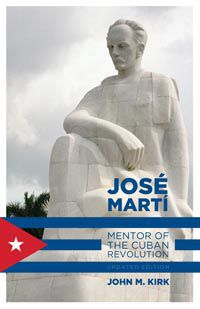Halifax Media Co-op
News from Nova Scotia's Grassroots
Book Review: Jose Marti - Mentor of the Cuban Revolution
- Jose Marti - Mentor of the Cuban Revolution
- By John M. Kirk
- Paperback ISBN: 9781552664667
- Paperback Price: $24.95 CAD
- Publication Date: Jan 2012
- Rights: World
- Pages: 200
Review by Emily Bagnald
John M. Kirk is a professor of languages and Latin Studies at Dalhousie University. On his faculty bio page, Kirk is jokingly referred to as a “jack of all trades, and a master of none.” However, it is clear to the reader of Jose Marti: Mentor of the Cuban Revolution that Kirk has a masterful grasp on the life and political ideology of his subject and of Latin American history and international relations.
Kirk’s in-depth study into Marti began in the form of his UBC doctoral dissertation on the iconic revolutionary, political philosopher and poet. The first incarnation of this book was José Martí, Mentor of the Cuban Nation published in 1983 by the University Presses of Florida. This edition, released in 2012 by Fernwood Books is a revised edition of the original. Like Marti’s philosophies, the ideas in this book are uncannily timeless and relevant. The text is both engaging and accessible to readers from a wide variety of backgrounds.
Kirk impresses upon the reader the immense significance and historical influence of Marti on Cuba and her people. Thanks to Kirk’s concise analysis, one can follow Marti through his experiences and understand how his ethical commitment remains constant while his political views develop - from liberal to ever more radical - as his knowledge of the world grows.
Marti prolifically transcribed his thoughts and his Obras Completas is a work of great breadth and heft. Kirk painstakingly sifted through this opus in order to form a holistic vision of Marti’s philosophies and character. Kirk then paints a colourful and clear picture for the reader of the man whom, he points out, many of varying political stripes are eager to claim as their ideological ally.
This book is clearly laid out in chapters that address the historical life of Marti, the progression of his political career and of his socio-political thought. We meet Marti the youth, already committed to the dignity of humanity as he travels with his father to Hanabana and is appalled at the mistreatment of slaves. Later we travel with Marti as he is convicted of treason and imprisoned in San Lazaro. We get the sense of his grief as he is exiled from his beloved patria, and learn with him as he travels through North and “Nostra” (South) America. We see how these travels help to inform his political thought and marvel at his political ideas, still relevant over a century later. We learn of Marti’s incredible feat of uniting a large and diverse group of Cuban-American exiles into a powerful political party known as the PRC – a group he inspired and who twice elected him their “Delgado”. We become familiar with a man ahead of his time, particularly in regards to his commitment to the environment and to sustainable business practices. We see that, although Marti was a gifted theorist, he was also a man committed to action, a man of bravery and loyalty. Marti was unafraid of, and indeed committed to re-evaluating his ideas in the face of new information.
Marti’s hopes for Cuba are explained in deep and engaging detail, beginning and returning to his unwavering commitment to Cuban independence. Also outlined are his plans for a democratic political system, and the social structures and economic policies Marti hoped to see his “patria” embrace. Laid out here are the fascinating ideas contained in Marti’s “moral foundation”; the rock hard moral character Marti hoped to instill in all citizens of the patria through education, which he believed would promote a “deeply patriotic humanitarian consciousness” in the citizens of Cuba. Marti believed this “moral foundation” would be the bedrock upon which the new “patria” would be built and sustained by the “new man” and ”new woman” of the nation. This morality defined by a selfless moral fortitude was inextricably linked to Marti’s concept of dignity and integrity that he hoped would be attained and embraced by all citizens in a free and liberated Cuba. According to Marti Cubans of his time had to struggle to gain dignity and freedom; these could not be handed to them.
Marti was one of the few remarkable people who are able to face enormous odds, identify the challenges at hand – those facing the world and particularly his own beloved patria - with a clear eye and a sharp intelligence, and yet remain optimistic and idealistic.
Through Kirk’s scholarship and well-crafted text, we get a sense of this multifaceted character, a rare combination of diplomat, attorney, committed anti-imperialist, revolutionary, poet and idealist. Despite the odds against his success, including the formidable opponents of colonial Spain and imperialist America, he remained committed, hopeful and steadfast, and his words continue to inspire a new generation of revolutionaries and political thinkers - in his “patria” and beyond.
The site for the Halifax local of The Media Co-op has been archived and will no longer be updated. Please visit the main Media Co-op website to learn more about the organization.



